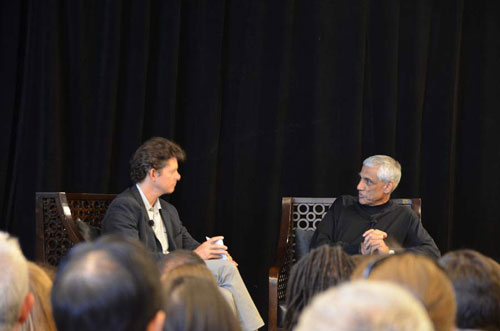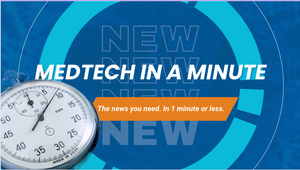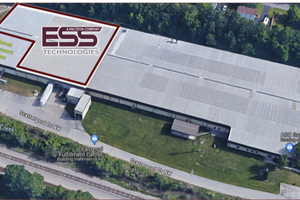Famed VC Vinod Khosla on the Death of Medicine as We Know It
“How many businesses do you know want to cut their revenue in half?” asked Vinod Khosla, a famous Silicon Valley venture capitalist at the Rock Health Innovation Summit in San Francisco on August 28. The healthcare system is understandably reluctant to do that, and for that reason, the status quo persists.“The way to solve healthcare is not to boil the ocean,” mused Khosla. “There is another way: start a seed on the side that grows exponentially,” he said. “Innovation starts at the fringes.”
August 30, 2012

Khosla knows more than a thing or two about exponential technologies. He was a co-founder of Sun Microsystems, and, through his Khosla Ventures firm, now invests in everything from mHealth products like the iPhone ECG to social media and cloud technologies.
Vinod Khosla (on the right) told Wired's Thomas Goetz that, in contrast to most healthcare VCs, he looks at healthcare from the perspective of the consumer. |
If technology now makes it possible for cars to drive themselves, why can’t technology reboot the way medicine is practiced? In California, legislators have recently sent a bill to the governor’s desk that would green light the development of autonomous automobiles. “Driving a car from San Francisco to L.A. is an order of magnitude more complicated than a doctor diagnosing a disease,” Khosla told Wired executive editor, who interviewed him onstage at the event.
Earlier this year, in a piece titled “Do We Need Doctors Or Algorithms?” Khosla argued for the importance of artificial intelligence in medicine’s future.
At this event, he continued that thesis, stating that machine learning could enable robots to perform a large proportion of doctors’ duties. “Eventually, we won’t need the doctor,” he said. "Machine learning makes a better Dr. House than Dr. House," he later added, referring to the Gregory House, MD, the fictional genius physician of the TV series “House.”
“My willingness to fail is exactly what gives me the ability to succeed.” |
Throughout his talk, he minced no words when it came to traditional medical practice, even comparing it to witchcraft. “[Doctors] do things because that is how things have been done,” he said. In the future, medicine will be based on probabilities.
New devices also will be substantially less expensive than legacy technologies, he said, pointing to the AliveCor iPhone ECG, which is “remarkably cheaper” than traditional clinical ECG units.
Khosla, who is an investor in the iPhone ECG, also used the device to illustrate the importance of software and hardware converging. In the future, lifescience companies won’t be able to choose between software and hardware—they’ll have to do both.
Khosla recommended that the entrepreneurs in attendance at the event be skeptical and not fearful of being perceived as wrong. “My willingness to fail is exactly what gives me the ability to succeed,” he said. “I don’t mind investing in something that has a 90% chance of not working but it has to have a real chance at making a big difference.”
He quoted George Bernard Shaw’s statement that: “all human progress depends upon the unreasonable man,” adding that “the reasonable people” do “all of the incremental stuff [in healthcare]. They will never do anything radical so the field is wide open.”
Brian Buntz is the editor-at-large at UBM Canon's medical group. Follow him on Twitter at @brian_buntz. He will be chairing the upcoming MedTech Cardio event held October 30 and 31 in Minneapolis.
Related Content:
You May Also Like


